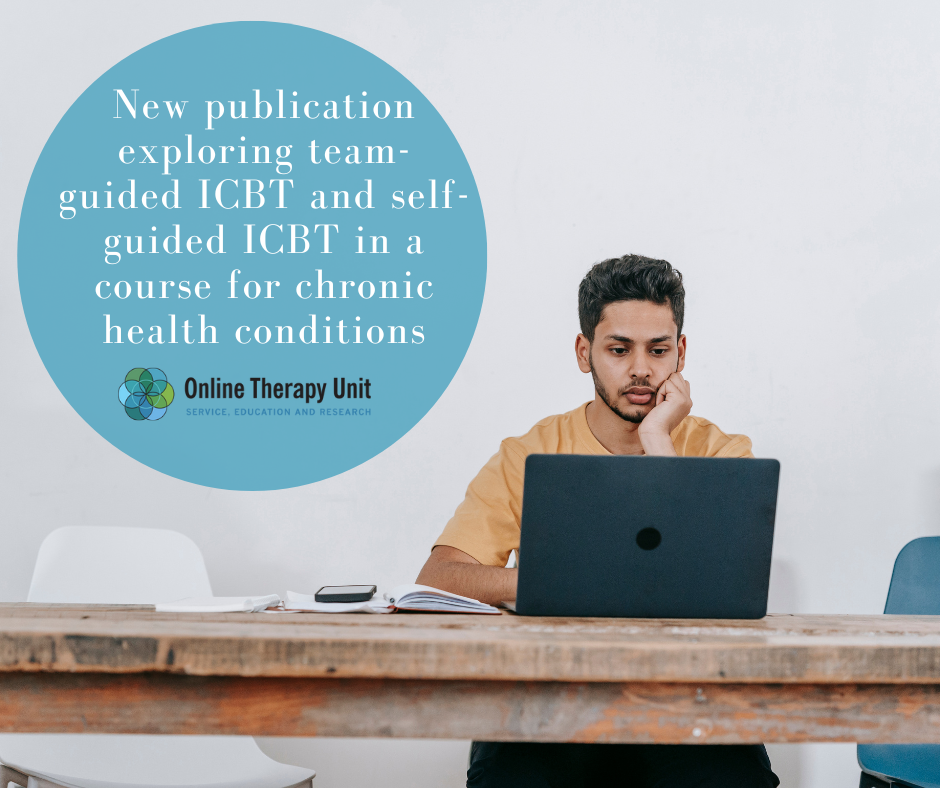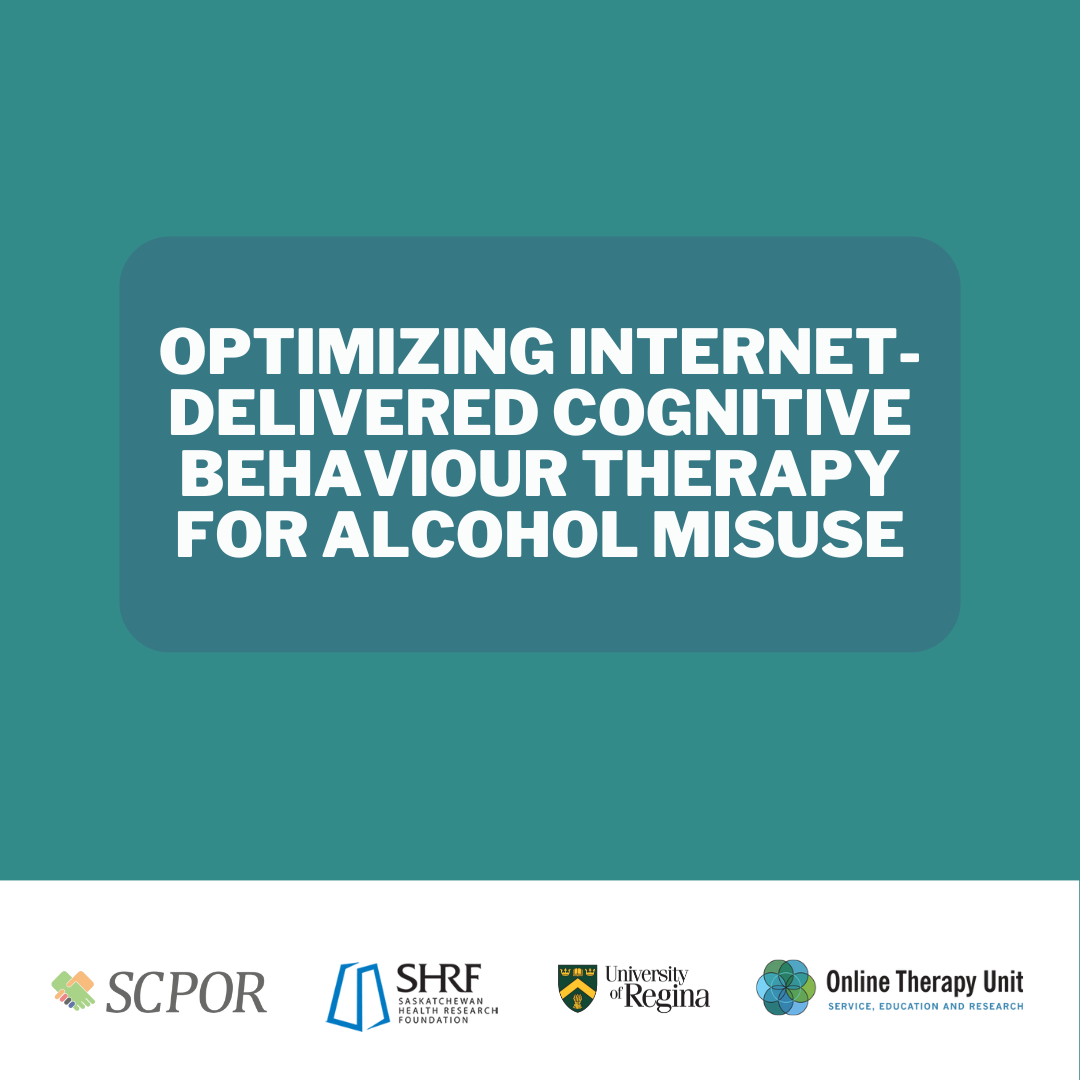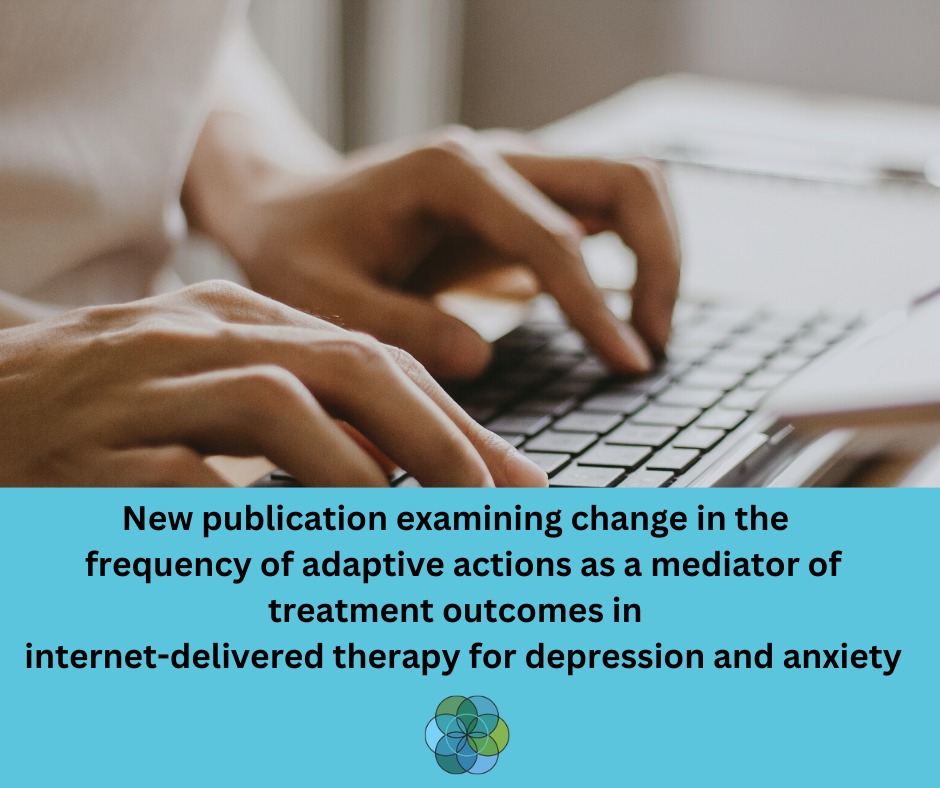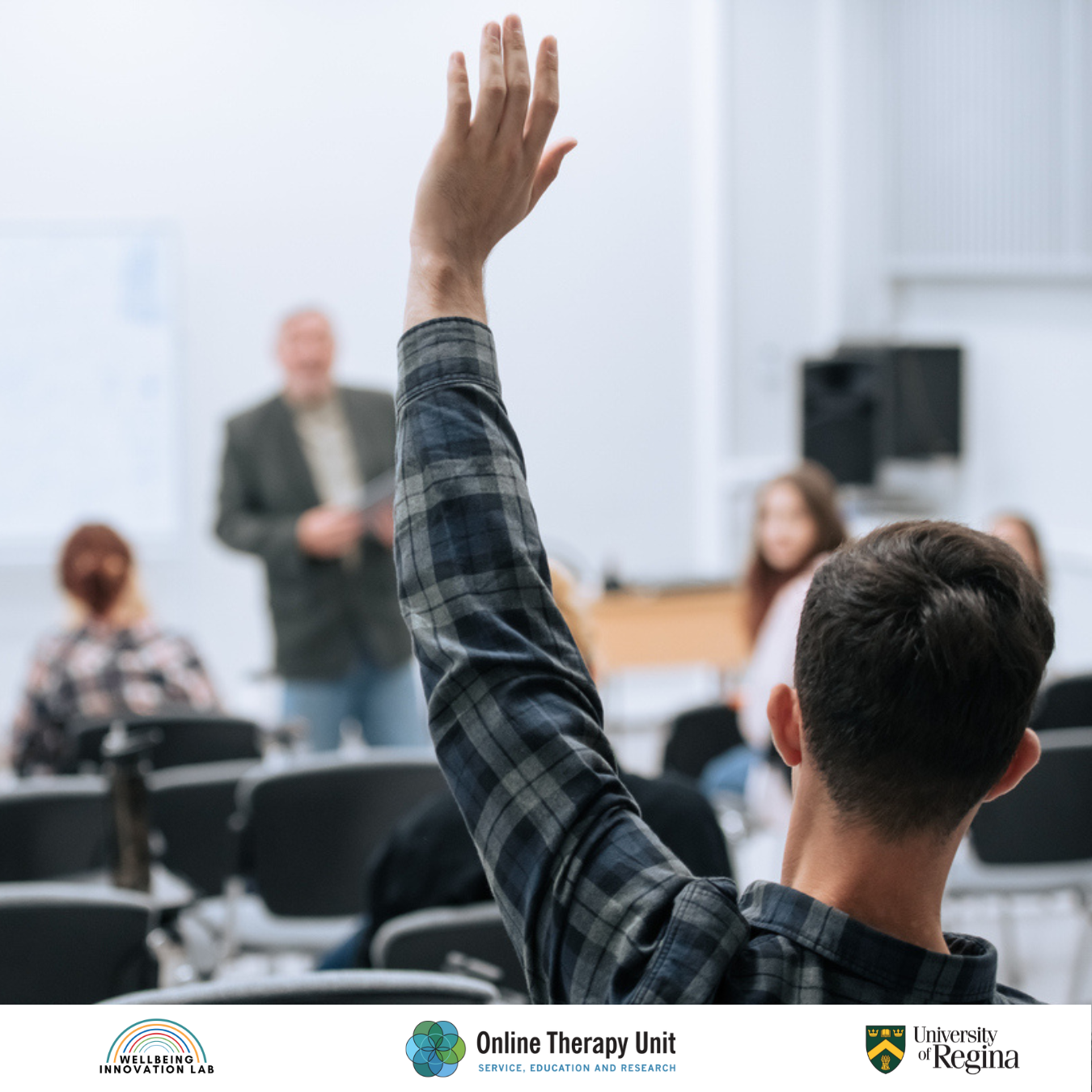Month: March 2022
Improving ICBT for Alcohol Misuse
Randomized trial examining extended support and booster lesson
The effect of adaptive actions on treatment outcomes
Cynthia Beck
A Usability Study of Internet-Delivered Cognitive Behaviour Therapy and Resource Tailored to Agriculture Producers
Masters Thesis Results, Cynthia Beck 2022
Background: Agriculture producers experience high rates of mental health challenges and are less likely to seek or to receive help for mental health concerns than the general population. Internet-delivered cognitive behaviour therapy (ICBT) is demonstrated to be effective for reducing symptoms of anxiety and depression and overcomes many barriers to receiving mental health care. This study assessed the usability of ICBT for Saskatchewan agricultural residents and its impact on symptoms of anxiety/depression, perceived stress, and resiliency.
Method: Saskatchewan residents involved in agriculture (n = 34) participated in the Agricultural Wellbeing Course (AWC), which is an online, five-lesson course providing strategies for dealing with symptoms of anxiety/depression with therapist-assistance. A mixed methods approach was used with measures completed at pre- and post-treatment and a follow-up interview. This study included developing an agriculturally tailored resource and exploring participant perceptions of ICBT post-treatment.
Results: 100% of participants reported that doing the course was worth their time and recommended it to other producers. Overall, their symptoms of anxiety, depression, and perceived stress largely improved, as did their reported resiliency. The agricultural participants had higher rates of engagement and completion than the general population in the Wellbeing Course. Participants spoke to strengths of the course, which included high therapist credibility, cultural appropriateness, and course content. All participants commented on how ICBT overcame barriers for them to access mental health care, including the ease of accessibility, convenience, flexibility, and reduced stigma. Areas for improvement included providing alternative delivery formats and therapist contact options. Challenges to participating included internal barriers (i.e., lack of motivation) and external barriers (i.e., time constraints, priorities). Course impact included improved skills, positive client impact on others and information sharing, improved view of mental health support, and words of advice to others.
Conclusion: Results suggest that ICBT is a usable and effective mental health treatment for the agriculture population and overcomes the many barriers that producers face in accessing mental health care.
Mixed-method Evaluation of an Online Motivational Interviewing Intervention as a Potential Adjunct to Internet-delivered Cognitive Behaviour Therapy
Honours Thesis Results, Cynthia Beck 2019
Background: While Internet-delivered cognitive behaviour therapy (ICBT) can effectively reduce anxiety and depression, not all clients benefit equally from treatment. Motivational Interviewing (MI) can result in behaviour change and, coupled with face-to-face therapy, can lead to enhanced outcomes; however, little research has examined MI as an adjunct to ICBT.
Purpose: The aim of the current study was to evaluate user feedback on a newly developed online MI intervention and to explore the immediate impact of the MI lesson on motivation for change.
Method: Two samples of participants, one with ICBT experience (n = 21) and one without ICBT experience (n = 20), worked through the exercises and watched the videos in the online MI intervention. Pre and post lesson participants reviewed and evaluated the online MI intervention.
Results: Following MI, both samples of participants reported a statistically significant increase in ability to reduce symptoms (p < .0001) and an increase that approached statistical significance in perceived importance of reducing symptoms (p < .052). Furthermore, after completing the MI intervention, participants reported increased confidence in recommending the lesson to a friend (p < .002) and increased belief that the lesson would be successful in helping someone to prepare for ICBT (p < .0001). Examination of ratings of the MI intervention and open-ended comments were positive, with participants recommending to expand the exercises and content to assist with self-reflection.
Conclusion: The current research provides evidence for the face validity of the MI intervention and sets the foundation for research on MI as a potential adjunct to ICBT for improving motivation prior to active treatment.
Sasheen Horse
Transdiagnostic Internet-delivered Cognitive Behaviour Therapy: Utility of a Motivational Interviewing Resource
Honours Thesis Results, Sasheen Horse 2022
Background: There is strong evidence for the effectiveness of internet-delivered cognitive behaviour therapy (ICBT) but clients can struggle with motivation during treatment. Online motivational interviewing (MI) has not yet been investigated during ICBT as a method of facilitating engagement and outcomes.
Purpose: This feasibility study investigated the potential use of an MI resource offered during ICBT by examining: (1) use of the resource; (2) patient and treatment variables associated with using the resource; (3) whether use of the resource was associated with improved engagement and outcomes; and (4) how those who used the resource evaluated it.
Method: This study used data collected from 763 clients enrolled in an ICBT course. Clients completed an MI resource evaluation measure at post-treatment. Symptoms were assessed at pre- and post-treatment. The website tracked treatment engagement.
Results: Approximately 15% of clients used the resource. Clients who were older, had higher education, higher depression, and lower anxiety at pre-treatment were more likely to use the resource. Those who reported using the resource had higher engagement (i.e., more lessons and more messages) in ICBT, but lower improvement in disability, which may have been a trigger for using the resource. Positive feedback on the MI resource outweighed the negative feedback, with 94% of clients identifying a positive aspect of the resource and 68% of clients reporting changes made in response to the resource.
Conclusion: Overall, the MI resource appears to have utility for a small portion of clients who complete ICBT and this study provides insight to who will use the resource. The resource will be available longer term for patient use in the Online Therapy Unit.
Vanessa Peynenburg
Examining motivational interviewing and booster sessions in Internet-delivered cognitive behaviour therapy for post-secondary students: An implementation trial
PhD Thesis Results, Vanessa Peynenburg 2022
Background: Nearly one-third of post-secondary students meet criteria for a mental disorder within any given year, with many students not receiving treatment. Internet-delivered cognitive behaviour therapy (ICBT) is an alternative to face-to-face services that is effective in general adult populations, but has been associated with high attrition rates and smaller effect sizes in student populations. Motivational interviewing (MI) is used by therapists in face-to-face settings and can help improve treatment completion and outcomes. Booster sessions are often used in face-to-face therapy to maintain long-term changes. To date, the use of online MI and booster sessions in ICBT for students has not been examined. In this implementation trial, the role of MI and booster sessions on treatment completion and outcomes was examined in Saskatchewan.
Methods: In this factorial trial (factor 1: presence of pre-treatment online MI); factor 2: presence of a booster lesson), a total of 308 clients were randomized to one of four groups: standard care, MI, booster, and MI + booster. All clients received a 5-week transdiagnostic ICBT course (the UniWellbeing Course) for symptoms of depression and anxiety. Primary outcomes included symptoms of depression, anxiety, and perceived academic functioning. All primary measures were administered at pre-treatment, post-treatment, and 1- and 3-month follow-up, Implementation outcomes (i.e., acceptability, adoption, and fidelity) were also examined.
Results: Across all four groups, clients experienced large reductions in symptoms of depression and anxiety, as well as small improvements in perceived academic functioning. Changes were maintained at 1-month and 3-month follow-up. No benefit was found for the inclusion of MI on treatment completion, although clients who were assigned to MI had slightly larger improvements in symptoms of depression and anxiety at post-treatment. 30.9% of client assigned to one of the booster groups accessed the booster. When examining the booster groups as a whole, no benefits were found for improvements in depression, anxiety, or perceived academic functioning at 3-month follow-up. However, a sub-analysis of clients who accessed the booster found a small advantage in favour of the booster for depression. Overall, clients were satisfied with ICBT, although treatment completion remained low. Uptake of the ICBT course was highest at the two largest post-secondary institutions in Saskatchewan.
Conclusions: There is some evidence to suggest that including MI at pre-treatment results in greater symptom reduction, although these benefits do not persist to 1-month and 3-month follow-up. The inclusion of a self-guided booster lesson may also help with continued symptom management up to 3-month follow-up, but low uptake is a barrier to clients experiencing these benefits. Findings from this trial contribute to the literature on improving ICBT outcomes for post-secondary students.
Perceptions of and preferences for Internet-delivered cognitive behaviour therapy for anxiety and depression in post-secondary students
Masters Thesis Results, Vanessa Peynenburg 2019
Background: Anxiety and depression are prevalent mental health concerns experienced by post-secondary students. Rates of help-seeking are often low in this population, and students face several barriers to accessing psychological treatment. Internet-delivered cognitive behaviour therapy (ICBT) is an effective alternative to face-to-face therapy that addresses these barriers in adult populations with some evidence showing ICBT can also be effective with students. Additional research is necessary to identify students perceptions of and preferences for ICBT to assist with future implementation efforts in student populations.
Methods: 314 Canadian post-secondary students completed an online survey and completed questionnaires about their symptoms of depression, anxiety, alcohol and drug use, and medical service utilization over the last 12 months. Students rated the acceptability and credibility of three treatment options (ICBT, face-to-face therapy, and medication) for the treatment of anxiety and depression. They also rated the utility of different kinds of content to be included in an ICBT course.
Results: The three treatment options were rated as moderately acceptable and credible. Students expressed a preference for face-to-face services (44.6%), followed by medication (31.9%), and finally ICBT (23.5%). ICBT became more preferable once students would have to wait to receive face-to-face therapy. Students who were female and had less severe symptoms of depression had more positive perceptions of the use of ICBT in the treatment of anxiety and depression.
Conclusions: While many students expressed a preference for face-to-face therapy or medication over ICBT, a substantial number preferred ICBT. Students often have to wait to receive face-to-face therapy, so ICBT may also be more desirable in these circumstances. Implementation trials in student populations are necessary to identify barriers to implementation efforts.







